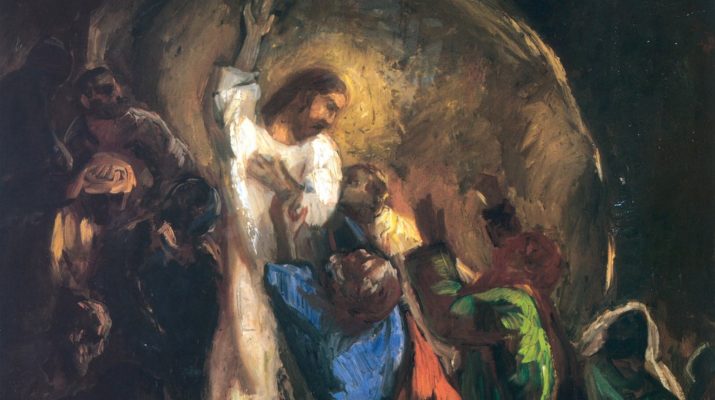Luke 24:44-47
Narrative Lectionary 342
44 Then he said to them, “These are my wordsA that I spoke to you while I was still with you—that everything writtenB about me in the lawC of Moses,D
A “words” = logos. From lego (to speak, tell, mention). This is word, statement, speech, analogy. It is a word that carries an idea or expresses a thought, a saying. It could refer to a person with a message or reasoning laid out in words. By implication, this could be a topic, line of reasoning, or a motive. It can be used for a divine utterance or as Word – Christ.
B “written” = grapho. This is to write or describe. It is where the word “graphic” comes from.
C “law” = nomos. From nemo (to parcel out). Literally, this is that which is assigned. It can be usage, custom, or law. This word can be used for human or divine law. It can be used specifically for the law of Moses or as a name for the Torah (the first five books of the Bible). Sometimes it is used for scripture as a whole, used of the Gospel, or of any theology. It is also used for the “tradition of the elders,” which would be the oral Torah – the tradition of the laws plus their interpretations as they were passed down over time. We must carefully consider which meaning of “law” is meant when we interpret passages the word is found in.
D “Moses” = Mouses. From Hebrew Mosheh (Moses); from mashah (to pull out in a literal or figurative sense, to draw out) OR from Egyptian mes or mesu (child, son i.e. child of…). This is Moses – the one drawn out from the water, which is to say, rescued. If derived from the Egyptian, his name would share a root with Rameses and Thutmose.
the prophets,E and the psalmsF mustG be fulfilled.”H
E “prophets” = prophetes. From pro (before, in front of, earlier than) + phemi (to declare, say, use contrasts in speaking to shed light on one point of view); {from phao (to shine) or phaino (to bring light, cause to appear, shine, become visible or clear)}. This is a prophet or poet – one who speaks with inspiration from God.
F “psalms” = psalmos. 7x in NT. From psallo (to twang, play, sing psalms, pluck a stringed instrument such as a harp); {from psao (to rub)}. This is a psalm, a song sung of praise – generally accompanied by a harp or other stringed instrument. It can also refer to the book of Psalms.
G “must” = dei. From deo (to tie, bind, compel; declare unlawful). This is what is necessary or proper. It is what is needed or what one should do – a duty or something inevitable. This refers to something absolutely necessary.
H “be fulfilled” = pleroo. From pleres (to be full, complete, abounding in, occupied with). This is to fill, make full or complete. Properly, this is filling something up to the maximum extent that it can be filled – an appropriate amount for its individual capacity. So, this is used figuratively for furnish, influence, satisfy, finish, preach, perfect, and fulfill.
45 Then he openedI their mindsJ to understandK the scriptures,L
I “opened” = dianoigo. 8x in NT. From dia (through, because of, across, thoroughly) + anoigo (to open or open up in a literal or figurative sense; to speak freely); {from ana (up, back, again, among, between, anew) + oigo (to open)}. This is to open fully. It can mean to open the womb as a firstborn does or figuratively to explain or expound.
J “minds” = nous. From noos (mind) OR from the same as ginosko (to know, recognize, realize, perceive, learn; gaining knowledge through personal experience). This is mind, understanding, reasoning faculty, intellect, capacity to reflect. It can refer to God’s mind or human minds – thoughts, feelings, will, or reflective thinking.
K “understand” = suniemi. From sun (with, together with) + hiemi (to send, put). This is to put together – used figuratively to mean understand, consider, gain insight. It is bringing together facts or notions and synthesizing them into a whole. It is making a summary to arrive at a final conclusion that includes how to apply the insight to life. It can also imply acting piously or being wise.
L “scriptures” = graphe. Related to “written” in v44. From grapho (see note B above). This is literally writing, a document. In the New Testament, this is always used for scripture.
46 and he said to them, “Thus it is written, that the MessiahM is to sufferN and to riseO from the deadP on the third day,
M “Messiah” = Christos. From chrio (consecrate by anointing with oil; often done for prophets, priests, or kings). Literally, the anointed one, Christ. The Greek word for Messiah.
N “is to suffer” = pascho. Akin to penthos (mourning, sorrow). This is to be acted on for good or ill. It is often used for negative treatment. Properly, it means feeling strong emotions – especially suffering. It can also be the ability to feel suffering.
O “rise” = anistemi. From ana (upwards, up, again, back, anew) + histemi (to make to stand, place, set up, establish, appoint, stand by, stand still, stand ready, stand firm, be steadfast). This is to raise up, rise, appear. It is to stand up literally or figuratively. Can also mean to resurrect.
P “dead” = nekros. Perhaps from nekus (corpse). This is dead of lifeless, mortal, corpse. It can also be used figuratively for powerless or ineffective. It is where the word “necrotic” comes from.
47 and that repentanceQ and forgivenessR of sinsS is to be proclaimedT
Q “repentance” = metanoia. Related to “minds” in v45. From meta (with, among, after, beyond) + noieo (to perceive, think, understand); {from nous (see note J above)}. This is literally to change one’s mind – to choose to think differently and so to act differently because of a moral compunction. It is an intentional change to the inner self. This word shares a root with the English “paranoia.”
R “forgiveness” = aphesis. 17x in NT. Related to “understand” in v45. From aphiemi (to sent away, release, abandon, lay aside, forgive); {from apo (from, away from) + hiemi (see note K above)}. This is sending away – a release or letting go. So, it can be releasing someone from debt, slavery, or some other obligation – thus, freedom or liberty. Figuratively it can mean to pardon as releasing from the debt of sin.
S “sins” = hamartia. From hamartano (to miss the mark, do wrong, make a mistake, sin); {from a (not) + meros (a part or share)}. Literally, this means not having one’s share or portion – like not receiving inheritance or what was allotted to you. This word means missing the mark so it is used for guilt, fault, and acts of sin.
T “proclaimed” = kerusso. This is to proclaim, preach, publish. Properly, it is to act as a herald – announcing something publicly with confidence and/or to persuade.
in his nameU to all nations,V beginningW from Jerusalem.X
U “name” = onoma. Related to “minds” in v45. May be from ginosko (see note J above). This is a name, authority, cause, character, fame, reputation. The name was thought to include something of the essence of the person so it was not thought to be separate from the person.
V “nations” = ethnos. Probably from etho (a custom or culture). This is people who are united by having similar customs or culture. Generally, it is used to refer to Gentiles. This is a tribe, race, nation, or Gentiles in general. This is where the term “ethnicity” comes from.
W “beginning” = archomai. From archo (to rule, begin, have first rank or have political power). This is to begin or rule.
X “Jerusalem” = Ierousalem. From Hebrew yerushalaim (probably foundation of peace); {from yarah (to throw, shoot, be stunned; to flow as water so figuratively to instruct or teach) + shalem (to make amends, to be complete or sound)}. This is Jerusalem, dwelling of peace.
Image credit: “Doubting Saint Thomas” by Béla Iványi-Grünwald.




